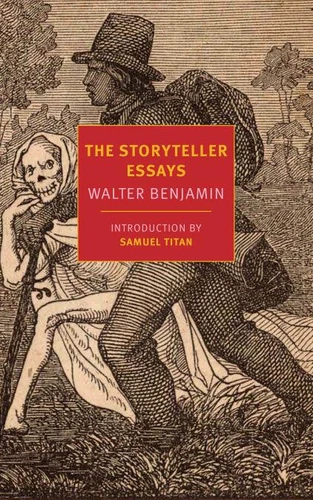The Storyteller Essays
Par : , ,Formats :
Disponible dans votre compte client Decitre ou Furet du Nord dès validation de votre commande. Le format ePub protégé est :
- Compatible avec une lecture sur My Vivlio (smartphone, tablette, ordinateur)
- Compatible avec une lecture sur liseuses Vivlio
- Pour les liseuses autres que Vivlio, vous devez utiliser le logiciel Adobe Digital Edition. Non compatible avec la lecture sur les liseuses Kindle, Remarkable et Sony
- Non compatible avec un achat hors France métropolitaine
 , qui est-ce ?
, qui est-ce ?Notre partenaire de plateforme de lecture numérique où vous retrouverez l'ensemble de vos ebooks gratuitement
Pour en savoir plus sur nos ebooks, consultez notre aide en ligne ici
- Nombre de pages128
- FormatePub
- ISBN978-1-68137-059-0
- EAN9781681370590
- Date de parution23/07/2019
- Protection num.Adobe DRM
- Taille1 Mo
- Infos supplémentairesepub
- ÉditeurNYRB Classics
Résumé
A new translation of philosopher Walter Benjamin's work as it pertains to his famous essay, "The Storyteller, " this collection includes short stories, book reviews, parables, and as a selection of writings by other authors who had an influence on Benjamin's work."The Storyteller" is one of Walter Benjamin's most important essays, a beautiful and suggestive meditation on the relation between narrative form, social life, and individual existence-and the product of at least a decade's work.
What might be called the story of The Storyteller Essays starts in 1926, with a piece Benjamin wrote about the German romantic Johann Peter Hebel. It continues in a series of short essays, book reviews, short stories, parables, and even radio shows for children. This collection brings them all together to give readers a new appreciation of how Benjamin's thinking changed and ripened over time, while including several key readings of his own-texts by his contemporaries Ernst Bloch and Georg Lukács; by Paul Valéry; and by Herodotus and Montaigne.
Finally, to bring things around, there are three short stories by "the incomparable Hebel" with whom the whole intellectual adventure began.
What might be called the story of The Storyteller Essays starts in 1926, with a piece Benjamin wrote about the German romantic Johann Peter Hebel. It continues in a series of short essays, book reviews, short stories, parables, and even radio shows for children. This collection brings them all together to give readers a new appreciation of how Benjamin's thinking changed and ripened over time, while including several key readings of his own-texts by his contemporaries Ernst Bloch and Georg Lukács; by Paul Valéry; and by Herodotus and Montaigne.
Finally, to bring things around, there are three short stories by "the incomparable Hebel" with whom the whole intellectual adventure began.
A new translation of philosopher Walter Benjamin's work as it pertains to his famous essay, "The Storyteller, " this collection includes short stories, book reviews, parables, and as a selection of writings by other authors who had an influence on Benjamin's work."The Storyteller" is one of Walter Benjamin's most important essays, a beautiful and suggestive meditation on the relation between narrative form, social life, and individual existence-and the product of at least a decade's work.
What might be called the story of The Storyteller Essays starts in 1926, with a piece Benjamin wrote about the German romantic Johann Peter Hebel. It continues in a series of short essays, book reviews, short stories, parables, and even radio shows for children. This collection brings them all together to give readers a new appreciation of how Benjamin's thinking changed and ripened over time, while including several key readings of his own-texts by his contemporaries Ernst Bloch and Georg Lukács; by Paul Valéry; and by Herodotus and Montaigne.
Finally, to bring things around, there are three short stories by "the incomparable Hebel" with whom the whole intellectual adventure began.
What might be called the story of The Storyteller Essays starts in 1926, with a piece Benjamin wrote about the German romantic Johann Peter Hebel. It continues in a series of short essays, book reviews, short stories, parables, and even radio shows for children. This collection brings them all together to give readers a new appreciation of how Benjamin's thinking changed and ripened over time, while including several key readings of his own-texts by his contemporaries Ernst Bloch and Georg Lukács; by Paul Valéry; and by Herodotus and Montaigne.
Finally, to bring things around, there are three short stories by "the incomparable Hebel" with whom the whole intellectual adventure began.























